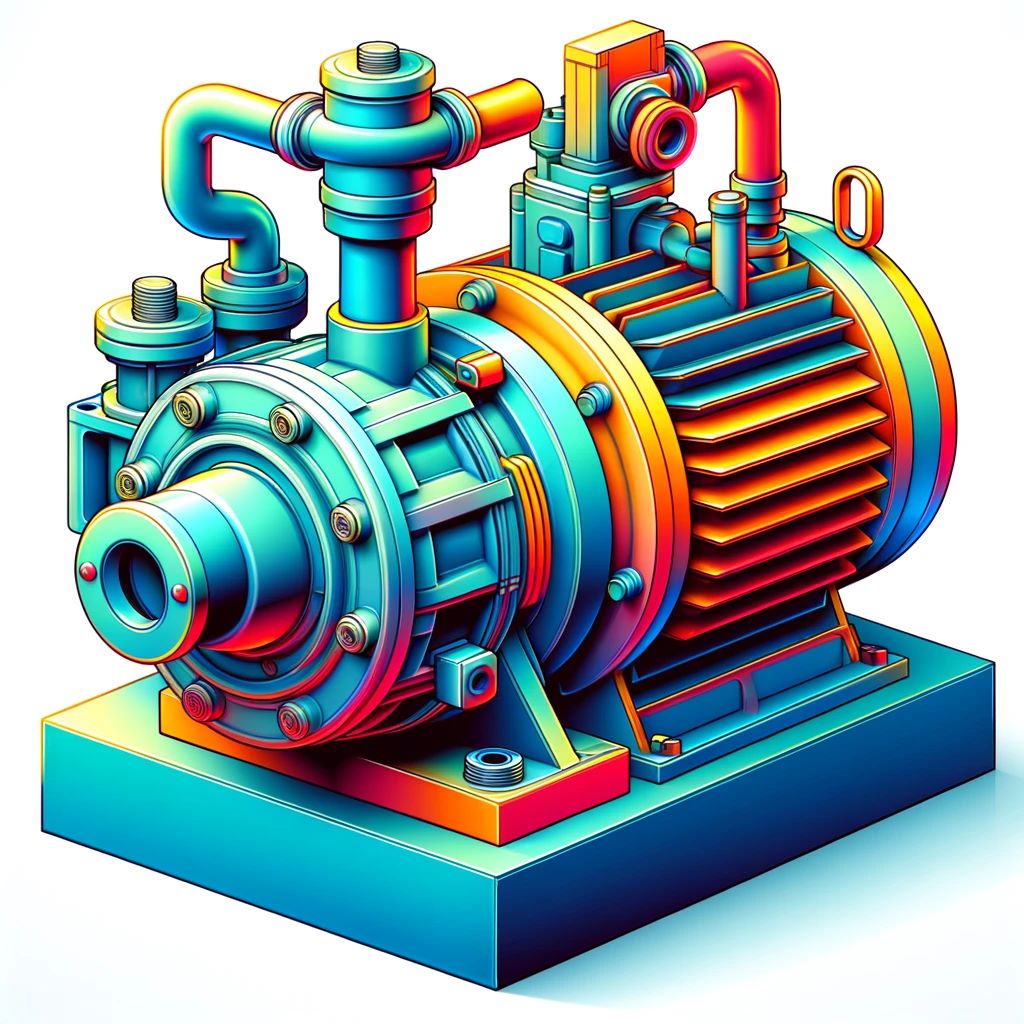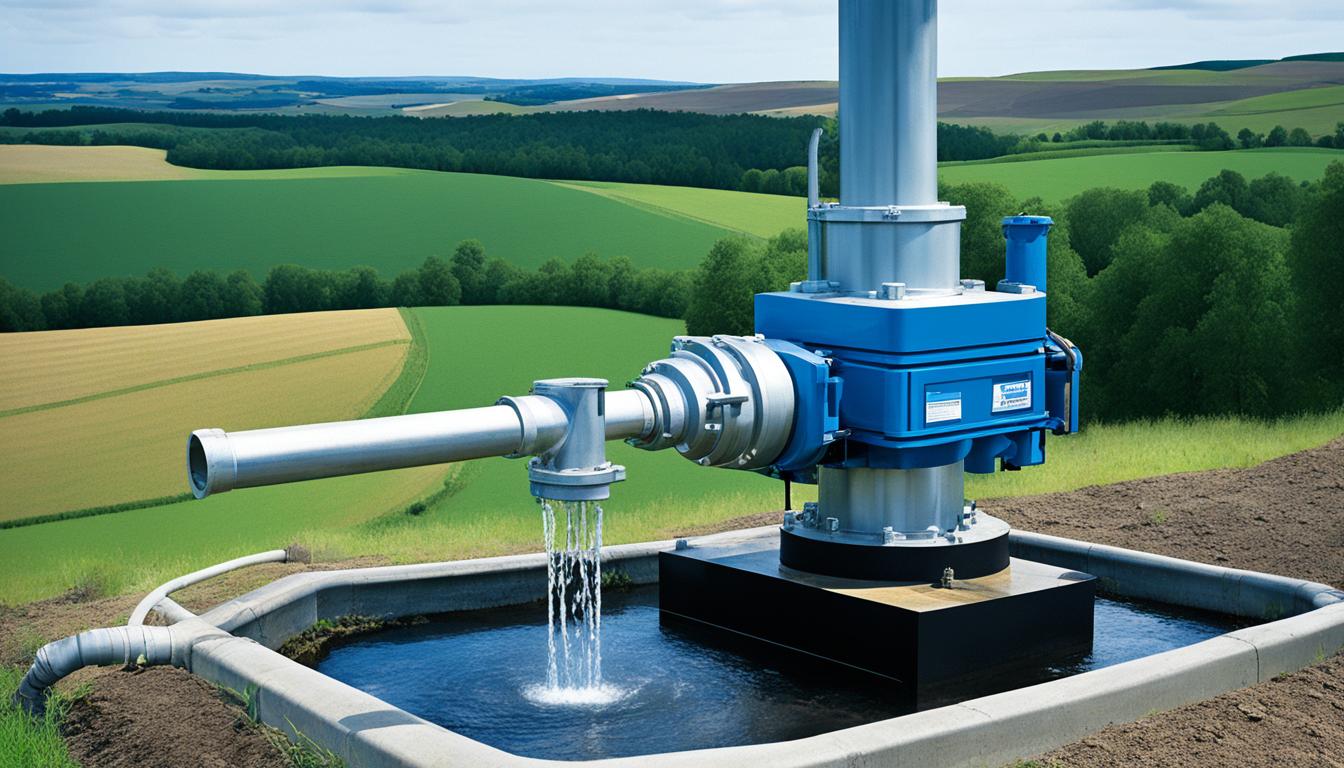This post contains affiliate links.
Did you know that your current well pump may not be meeting your water needs? If you rely on a private well for your water supply, it’s essential to ensure that your well pump is providing adequate flow and pressure. Fortunately, there are several options for upgrading your well pump to enhance its performance and meet your household’s water demands. From adding a booster pump to replacing the pump with a larger model, these upgrades can make a significant difference in the flow and water pressure in your home.
Key Takeaways:
- Upgrading your well pump can enhance flow and improve water pressure in your home.
- Options for well pump upgrades include adding a booster pump, replacing the pump with a larger model, and installing a larger pressure tank.
- A water treatment system can be added to improve water quality.
- Consult with a professional well contractor to determine the best upgrade options for your specific well.
- Well pump upgrades and replacements can ensure a more consistent water supply and enhance overall satisfaction with your home’s water system.
Boosting Well Pump Power with a Booster Pump
If your well pump doesn’t provide enough power or consistent flow, a booster pump can be a valuable addition. Also known as a constant flow pump, a booster pump increases the pump’s power to ensure a more constant stream of water. This is particularly beneficial if you experience poor water pressure on higher floors of your home.
Installing a booster pump can help address water pressure problems and ensure a steady water supply throughout your house. By boosting the power of your well pump, a booster pump provides the necessary pressure to overcome any challenges related to gravity-based water flow. It enhances the performance and efficiency of your well pump, resulting in improved water pressure on all levels of your home.
Consulting with a well contractor is crucial to determine if a booster pump is a suitable upgrade for your well pump. They can assess your current water pressure issues, evaluate the capacity of your well, and recommend the appropriate booster pump size and model that aligns with your needs.
Benefits of a Booster Pump:
- Consistent water pressure throughout your home
- Improved flow rate
- Enhanced performance of your well pump
- Reliable water supply, especially on higher floors
“Adding a booster pump can significantly improve water pressure and ensure a steady flow in homes with poor water pressure on upper floors.” – Expert Well Contractor
With a booster pump, you can enjoy reliable water pressure throughout your home and put an end to water pressure problems. Say goodbye to weak showers and slow-filling appliances. Take the necessary steps to boost your well pump power and experience the convenience of a constant and adequate water flow.
| Problem | Solution |
|---|---|
| Low water pressure on upper floors | Install a booster pump to increase pump power |
| Inconsistent water flow | Utilize a constant flow pump to maintain a steady stream of water |
| Gravity-based water flow challenges | Add a booster pump to overcome the effects of gravity |
| Improved overall water pressure | Upgrade your well pump power with a booster pump |
Replacing the Well Pump with a Larger Model
If your current well pump is reaching the end of its lifespan or has been damaged, it may be time to consider replacing it with a larger and more powerful model. This upgrade can enhance the water flow in your home and ensure a reliable water supply. However, before making the switch, it’s important to take into account the capacity of your well to ensure compatibility between the pump and well output.
Replacing your well pump with a larger model offers several advantages. Firstly, it provides increased pumping power, enabling a higher water flow rate and improved water pressure throughout your home. This is especially beneficial for households with high water demands or multiple fixtures operating simultaneously.
Furthermore, a larger well pump often comes with enhanced durability and a longer lifespan compared to smaller models. By investing in a well-built and robust pump, you can enjoy a more reliable and long-lasting water system, reducing the need for frequent repairs and replacements.
When considering a well pump replacement, it’s crucial to consult with a professional well contractor who can assess your well’s capacity. They will help determine the appropriate size and specifications for the new pump based on your well’s output and your household’s water needs.
Additionally, keep in mind that the well pump is just one component of the well system. The well’s capacity and condition also play a significant role in determining the overall water output. A well contractor can evaluate the well’s capacity and advise on whether any modifications or upgrades are necessary to accommodate the larger pump.
To further emphasize the importance of replacing a well pump with a larger model, consider the following example:
“After years of struggling with low water pressure and limited flow, John’s well pump finally broke down. He decided it was time for an upgrade and opted for a larger well pump. The installation not only improved the water flow in his home but also extended the lifespan of the pump, saving John from future repairs and replacements. Now, he enjoys consistent and powerful water pressure, meeting the needs of his growing family.”
Table: Comparison of Well Pump Sizes and Capacities
| Well Pump Size | Well Capacity | Water Flow Rate | Benefits |
|---|---|---|---|
| Standard 1/2 HP Pump | Low to Medium | 5-10 gallons per minute (GPM) | Basic water supply for smaller households |
| 3/4 HP Pump | Medium | 10-15 GPM | Increased water flow for medium-sized households |
| 1 HP Pump | Medium to High | 15-20 GPM | Powerful water flow for larger households with higher demands |
| 1.5 HP Pump | High | 20-25 GPM | Maximum water flow for large properties or commercial use |
By upgrading to a larger well pump, you can enhance the water flow in your home, improve water pressure, and ensure a reliable water supply. Remember to consult with a professional well contractor to determine the appropriate size and specifications for your new pump, taking into account your well’s capacity and your household’s water needs. With a larger well pump, you can enjoy the benefits of increased pumping power and a longer lifespan, providing peace of mind for years to come.
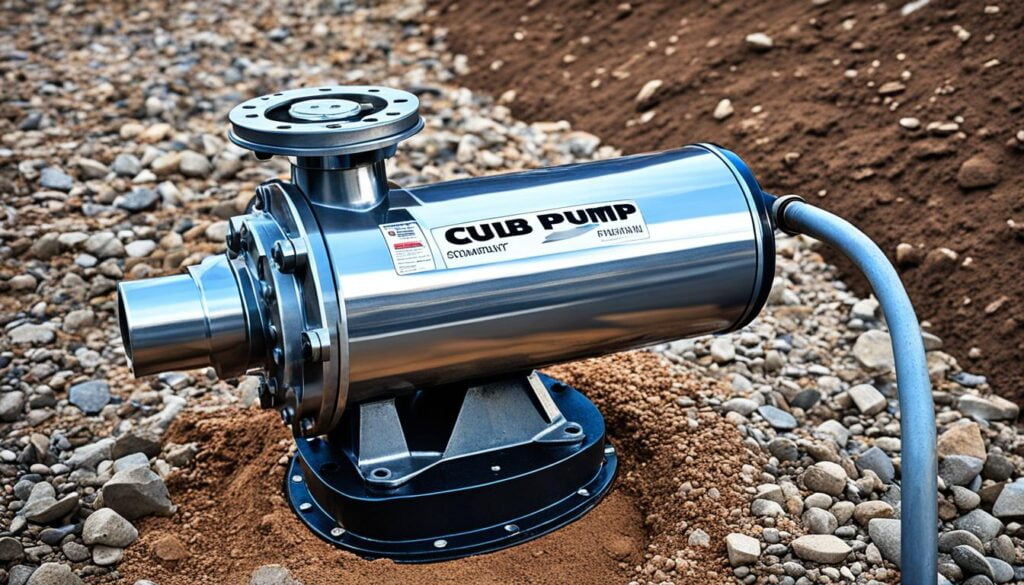
Improving Longevity with a Larger Pressure Tank
One effective way to enhance the longevity of your well pump is by upgrading to a larger pressure tank. A larger tank provides several benefits that can contribute to the overall health and durability of your well pump.
- Reduced Pump Cycling: Upgrading to a larger pressure tank enables longer plumbing usage before the pump needs to cycle back on. This reduces the frequency of pump cycling, minimizing wear and tear on the well pump over time.
- Extended Lifespan: The reduced pump cycling achieved with a larger pressure tank helps extend the lifespan of the well pump. By reducing unnecessary strain, the pump can last longer, saving you from the hassle and expense of premature replacement.
- Improved Efficiency: A larger pressure tank allows your well pump to operate more efficiently. With longer periods between cycling, the pump can maintain consistent water flow without excessive strain, resulting in improved energy efficiency.
Consulting with a professional well contractor can provide valuable insights into the benefits of upgrading to a larger pressure tank. They can assess your current setup, recommend the appropriate tank size, and ensure a seamless installation process that enhances the performance and longevity of your well pump.
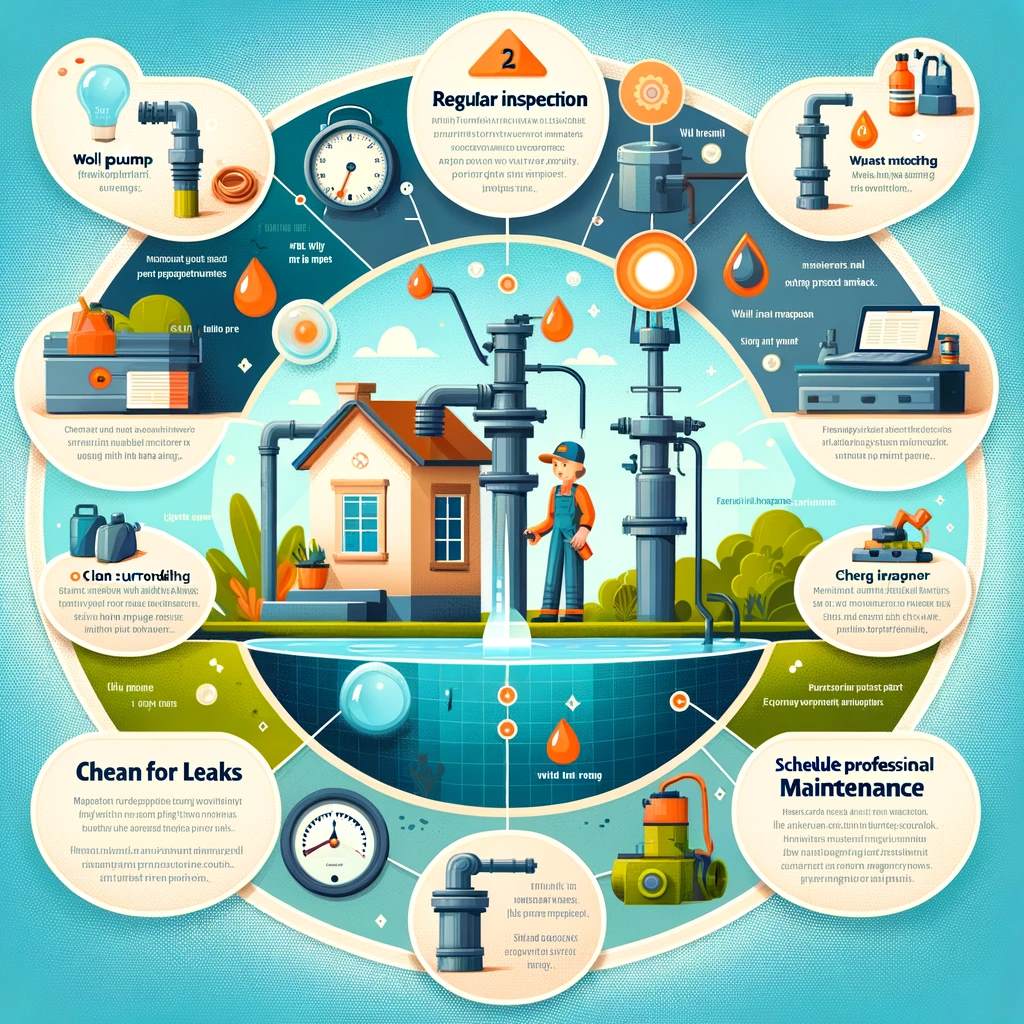
Enhancing Water Quality with a Treatment System
If your well water contains sediment or has an unusual taste, adding a water treatment system can improve its quality. Different treatment systems, including water softeners, reverse osmosis systems, and filtration systems, can ensure clean, healthy, and better-tasting water for your household. Prioritize professional testing of your well water before making any changes or additions to the system.
The Importance of Water Testing
Before selecting a water treatment system, it’s crucial to evaluate the quality of your well water through professional testing. Testing helps identify any contaminants and impurities present, providing valuable insights into which treatment options will be most effective. By understanding the specific issues affecting your water supply, you can make informed decisions to address them.
“Professional water testing is the first step in improving your water quality. It ensures that you choose the right treatment system tailored to your unique needs and results in healthier, better-tasting water for you and your family.”
Different Treatment Systems for Enhanced Water Quality
There are various treatment systems available to enhance the quality of your well water. Let’s explore a few popular options:
- A water softener removes minerals such as calcium and magnesium that cause hard water. Softened water not only feels better on your skin and hair but also prevents scale buildup in appliances and pipes.
- A reverse osmosis system uses a semipermeable membrane to remove contaminants, bacteria, and impurities from your water. This filtration process ensures clean, purified water, making it ideal for drinking and cooking.
- A filtration system employs various filtering mechanisms to eliminate sediments, chlorine, and other impurities. It’s an excellent option for improving the taste, odor, and overall quality of your well water.
Consult with a water treatment specialist to determine the most suitable system for your specific water quality concerns. They can recommend the appropriate treatment system based on your test results, ensuring optimal results.
The selection of the ideal water treatment system should be based on various factors, including the specific contaminants present in your well water, the desired level of water treatment, and your budget. It’s recommended to work closely with a certified water treatment professional who can assess your water quality testing results and guide you in choosing the most effective treatment system for your needs.
Increasing Home Water Pressure with Adjustments
When it comes to improving your home’s water pressure, making adjustments to your pressure tank settings can make a significant difference. Most well pressure tanks come with default settings of 28 psi, but by adjusting these settings, you can enhance the water pressure in your home. Consider increasing the pressure tank settings to 40/60 psi for improved results.
By increasing the pressure tank settings, you allow the tank to store more water at a higher pressure, resulting in a stronger and more consistent water flow throughout your household plumbing system. This adjustment can help alleviate issues such as low water pressure in showers, slow-filling toilets, and weak flow from faucets.
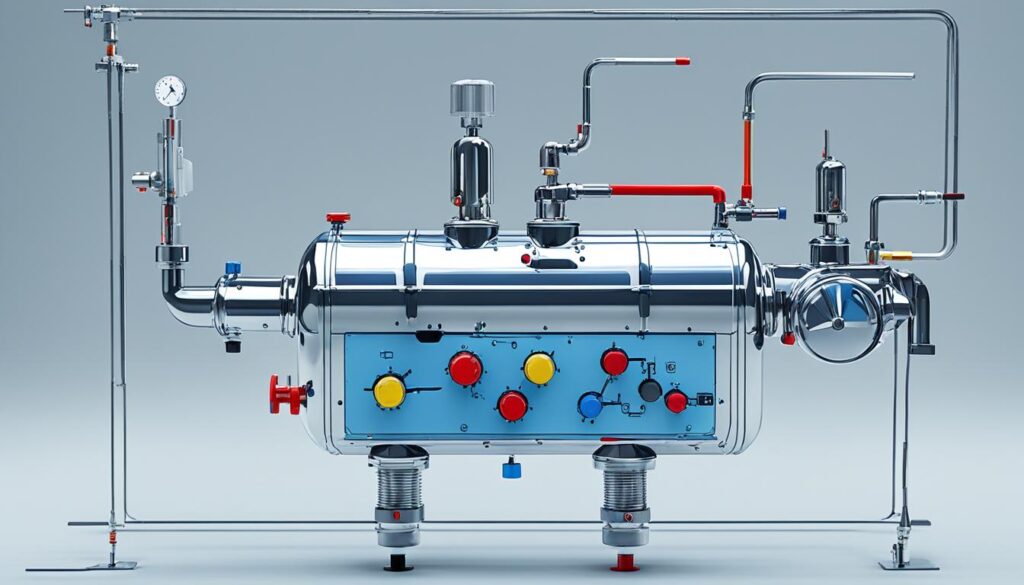
Eliminating Water Pressure Fluctuations with a Constant Pressure System
While adjusting the pressure tank settings can improve water pressure, you may still experience fluctuations in water pressure. These fluctuations can occur when multiple taps or appliances are being used simultaneously, causing a drop in pressure.
To address this issue, consider upgrading to a constant pressure system. A constant pressure system uses electronic water pressure sensors in the tank to maintain a consistent water pressure, regardless of the demand on the system. This ensures a more stable and reliable water supply throughout your home, even during peak usage times.
With a constant pressure system, you can say goodbye to frustrating water pressure fluctuations and enjoy a more consistent flow of water in your home.
Consult with a professional well contractor to determine if a constant pressure system is a suitable upgrade for your water system. They can assess your current setup, recommend the appropriate adjustments, and install the necessary equipment to achieve a constant and reliable water pressure.
Upgrading to a Higher Flow Capacity Pump
If your current well pump has a low flow rate and struggles to meet your household’s water demands, upgrading to a pump with a higher flow capacity can be beneficial. The flow rate is measured in gallons per minute (GPM), and a pump with a higher GPM rating can improve water pressure and supply. Consult with a well contractor to determine the suitable flow capacity for your needs.
When considering upgrading to a higher flow capacity pump, it’s important to understand how the pump’s flow rate affects meeting your water demands. A higher flow capacity pump can deliver a greater volume of water per minute, ensuring a consistent and adequate supply for various household activities. Whether it’s running multiple showers simultaneously, operating large appliances like washing machines or dishwashers, or maintaining irrigation systems, a higher flow capacity pump can meet your water requirements with ease.
To better understand the impact of flow rate on meeting water demands, consider the example below:
Table: Comparing Flow Rates and Water Demands
| Flow Capacity (GPM) | Water Demand |
|---|---|
| 10 GPM | Adequate for basic household needs like faucets and showers |
| 15 GPM | Capable of handling additional appliances like washing machines |
| 20 GPM | Provides sufficient water supply for irrigation systems |
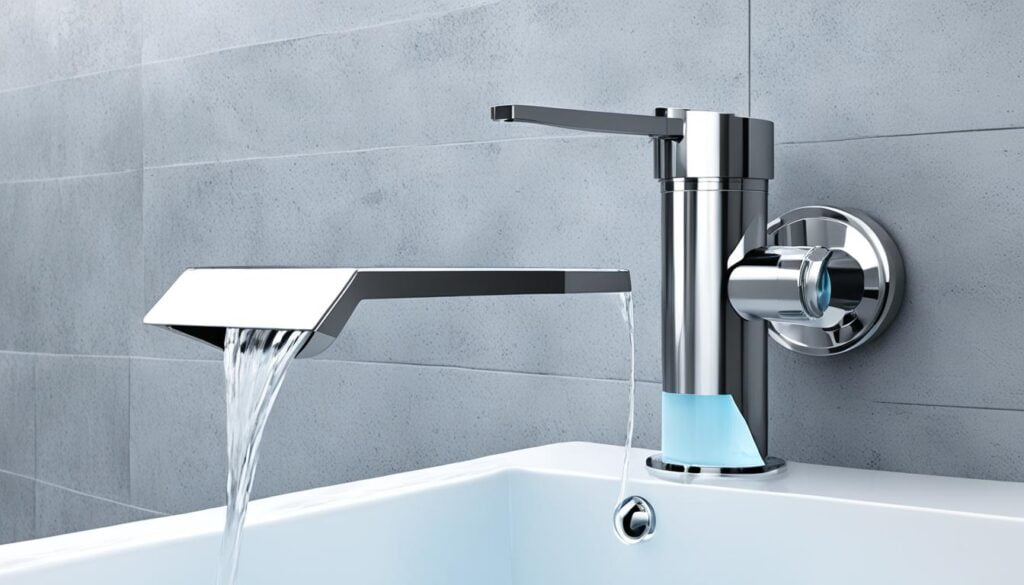
As seen in the table above, a higher flow capacity pump can meet a wider range of water demands. By investing in a pump with a higher GPM rating, you can ensure uninterrupted water flow and avoid frustrating scenarios of low water pressure or inadequate supply.
Consulting with a Well Contractor for the Right Flow Capacity
When upgrading to a higher flow capacity pump, it’s important to consult with a well contractor with expertise in pump installations and water systems. A well contractor can assess your water demands, well capacity, and other considerations to recommend the appropriate flow capacity for your specific needs.
Factors that influence the required flow capacity include the number of occupants in your household, the size of your property, the number of bathrooms, and any unique water demands you may have. By working closely with a well contractor, you can ensure that the upgraded pump meets your current and future water needs.
“Upgrading to a higher flow capacity pump can significantly improve water pressure and supply, ensuring that your household’s water demands are met with ease.”
Furthermore, a well contractor can also provide guidance on other complementary upgrades or adjustments that may enhance your overall water system performance and efficiency. From pressure tank adjustments to water treatment recommendations, their expertise can ensure a comprehensive and tailored solution for your well pump and water supply.
In conclusion, upgrading to a higher flow capacity pump is a strategic investment to improve your well’s performance and meet your household’s water demands. By consulting with a well contractor and considering factors such as flow rate and water needs, you can ensure a more reliable and efficient water supply system.
Consistent Pressure with a Constant Pressure System
For homes experiencing frequent water pressure fluctuations, upgrading to a constant pressure system can provide a solution. These systems utilize electronic water pressure sensors in the tank to maintain consistent water pressure. By regulating the pump based on even slight drops in pressure, a constant pressure system ensures a more stable water supply throughout the house.
| Benefits of a Constant Pressure System | Drawbacks of Fluctuating Water Pressure |
|---|---|
| 1. Consistent water pressure throughout the house | 1. Inadequate water flow for showers and appliances |
| 2. Improved performance for multiple water outlets | 2. Difficulty filling large water containers |
| 3. Reduced pipe noises and water hammering | 3. Inconsistent flushing of toilets |
| 4. Enhanced lifespan of water appliances | 4. Inefficient operation of sprinkler systems |
Upgrading to a constant pressure system not only resolves water pressure fluctuations but also offers numerous benefits for everyday water usage in your home.
How Constant Pressure Systems Work
A constant pressure system includes an electronic pressure sensor installed in the water tank. This sensor continuously monitors the water pressure and adjusts the pump’s speed accordingly. As soon as the pressure decreases slightly, the system detects this change and boosts the pump’s speed to maintain a consistent pressure level.
“Upgrade to a constant pressure system for a more enjoyable and hassle-free water experience in your home.”
With a constant pressure system, you no longer have to worry about sudden drops in water pressure while taking a shower or using multiple water outlets simultaneously. It ensures a reliable and consistent flow of water, making daily tasks more convenient and efficient.
Increasing Water Pressure with a Booster Pump
If you notice significantly lower water pressure on the upper floors of your home, installing a water pressure booster pump can help. Standard well pumps often struggle to compete with gravity when supplying water to higher levels. A booster pump increases the speed of the water flow, making it easier to reach fixtures on the top floor. Consider adding a booster pump to improve overall water pressure.
“With a booster pump, you no longer have to worry about low water pressure on your upper floors. It’s a game-changer!” – Nancy P.
Installing a water pressure booster pump is a practical solution to combat your water pressure woes. By increasing the water flow rate, the booster pump ensures a consistent and strong supply of water to every corner of your home. Whether you’re taking a shower on the top floor or using multiple fixtures simultaneously, the booster pump helps maintain efficient water pressure, enhancing your overall living experience.
Benefits of Installing a Water Pressure Booster Pump
- Eliminates low water pressure on upper floors
- Provides a consistent and strong water flow
- Improves the performance of showers, faucets, and appliances
- Reduces waiting time for heating water
- Enhances water pressure for irrigation systems
When choosing a water pressure booster pump, consider factors such as the pump’s power, compatibility with your existing well pump, and the size of your plumbing system. A professional well contractor can guide you in selecting the right booster pump for your specific needs and ensure a seamless installation process.
Expert Well Services for Upgrades and Replacement
When it comes to considering well pump upgrades or replacements, it is crucial to consult with a professional well contractor who specializes in well installation and repair. These experts provide comprehensive well services, ensuring that you make informed choices and achieve the best possible results for your well pump. Whether you are looking to upgrade your well pump to enhance flow or replace a faulty pump, a professional well contractor possesses the knowledge and expertise to guide you through the process.
By consulting with a trusted well contractor, you can discuss your specific needs and receive expert assistance tailored to your well system. These professionals will assess your well’s condition, water demands, and any existing issues to recommend appropriate upgrades or replacement options. Their in-depth understanding of well systems enables them to offer insights and advice that are specific to your situation.
Professional well contractors offer a range of well services that cover all aspects of well pump upgrades and replacements. From evaluating the well’s capacity and recommending a suitable pump size to providing installation and repair services, they handle every step of the process with precision and efficiency.
In addition to expert guidance and installation, professional well contractors also prioritize customer satisfaction and strive to deliver long-lasting results. They use high-quality materials and employ skilled technicians who are trained to handle all types of well pump systems. Their goal is to ensure that your well pump upgrade or replacement is completed with the utmost care and meets your expectations.
Ensure a smooth and successful well pump upgrade or replacement by contacting a professional well contractor. With their expertise and well services, you can enhance the performance of your well system and enjoy a reliable and consistent water supply.
Benefits of Consulting with a Professional Well Contractor
- Access to expert knowledge and advice specific to your well system
- Comprehensive well services, including evaluation, installation, and repair
- Assurance of high-quality materials and skilled technicians
- Long-lasting results and customer satisfaction
| Benefits of Consulting with a Professional Well Contractor |
|---|
| Access to expert knowledge and advice specific to your well system |
| Comprehensive well services, including evaluation, installation, and repair |
| Assurance of high-quality materials and skilled technicians |
| Long-lasting results and customer satisfaction |
Consulting with a professional well contractor is crucial for well pump upgrades and replacements. Their expertise, comprehensive well services, and dedication to customer satisfaction ensure that you make informed decisions and achieve the best possible results for your well system.
Conclusion
Enhancing your well pump through upgrades and replacements can have a significant impact on the flow and water pressure in your home. By considering options such as adding a booster pump, replacing the well pump, upgrading the pressure tank, or installing a water treatment system, you can cater to your individual needs and ensure a more consistent water supply.
It is essential to consult with a professional well contractor who can assess your specific situation and recommend the best upgrade options. With the right upgrades in place, you can elevate your water supply and experience improved water pressure throughout your home, leading to a more satisfying and efficient water system.
Don’t settle for inconsistent water flow or low pressure. Take control of your water supply by investing in well pump upgrades and replacement that will provide you with a more consistent and reliable water flow. Trust the expertise of a professional well contractor to guide you towards the right upgrade options for your specific situation. Improve your daily life and enjoy the benefits of consistent water flow and improved water pressure in your home.
FAQ
What are some options for upgrading a well pump to enhance flow?
There are several options for upgrading a well pump to enhance flow, including adding a booster pump, replacing the pump with a larger model, installing a larger pressure tank, and incorporating a water treatment system.
What is a booster pump and how can it improve water pressure?
A booster pump, also known as a constant flow pump, increases the power of the pump to ensure a more constant stream of water. It can be a valuable addition if you have poor water pressure on higher floors of your home.
When should I consider replacing my well pump with a larger model?
If your current well pump is reaching the end of its lifespan or is damaged, replacing it with a larger and more powerful model can be a viable upgrade option. However, it’s important to consider the capacity of your well and consult with a well contractor.
How can a larger pressure tank improve the longevity of my well pump?
Upgrading to a larger pressure tank allows for longer plumbing usage before the pump needs to cycle back on. By reducing the frequency of pump cycling, a larger pressure tank can help prevent premature wear and tear on the well pump.
What are the benefits of adding a water treatment system to my well pump?
Adding a water treatment system can improve the quality of your well water by reducing sediment and improving taste. Different treatment systems, such as water softeners, reverse osmosis systems, and filtration systems, can ensure clean and better-tasting water for your household.
How can adjusting the settings of my pressure tank improve water pressure?
Most well pressure tanks have default settings of 28 psi, but adjusting the settings to 40/60 psi can enhance water pressure. Additionally, upgrading to a constant pressure system can eliminate water pressure fluctuations by maintaining a consistent tank water pressure.
How can upgrading to a pump with a higher flow capacity improve water pressure?
If your current well pump has a low flow rate and struggles to meet your household’s water demands, upgrading to a pump with a higher flow capacity can improve water pressure and supply. Consult with a well contractor to determine the suitable flow capacity for your needs.
What is a constant pressure system and how can it provide a stable water supply?
A constant pressure system utilizes electronic water pressure sensors in the tank to maintain consistent water pressure. By regulating the pump based on even slight drops in pressure, a constant pressure system ensures a more stable water supply throughout the house.
How can a water pressure booster pump help improve water pressure on upper floors?
Installing a water pressure booster pump can increase the speed of the water flow, making it easier to reach fixtures on the top floor. This is particularly beneficial for homes experiencing significantly lower water pressure on higher floors.
Why is it important to consult with a professional well contractor for upgrades and replacements?
When considering well pump upgrades or replacements, it’s crucial to consult with a respected well installation and repair professional. They can provide comprehensive well services, ensuring that you make the right choices and obtain the best possible results.
How can well pump upgrades and replacements enhance water flow and improve water pressure?
Well pump upgrades and replacements, such as adding a booster pump, replacing the well pump, upgrading the pressure tank, or installing a water treatment system, cater to individual needs and ensure a more consistent water supply. Consult with a professional well contractor to determine the best upgrade options for your specific situation.
Source Links
- https://brucemackay.com/4-ways-to-upgrade-your-well/
- https://terrylove.com/forums/index.php?threads/upgrade-well-pump-and-system.21357/
- https://www.mccallbro.com/4-ways-to-increase-home-water-pressure-when-you-have-a-well
This post contains affiliate links.
